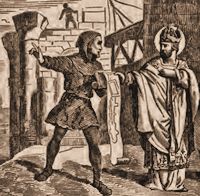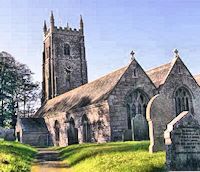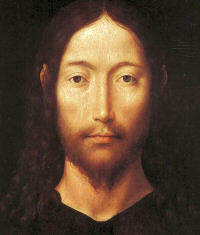Easter: April 15th
Tuesday of the Fourth Week of Easter
Other Commemorations: St. Paternus, Bishop (RM)
» Enjoy our Liturgical Seasons series of e-books!
"I have told you, but you do not believe. The works I do in my Father's name are my witness; but you do not believe, because you are no sheep of mine. The sheep that belong to me listen to my voice; I know them and they follow me. I give them eternal life; they will never be lost and not one will ever steal them from me. The Father who gave them to me is greater than anyone, and no one can steal from the Father. The Father and I are one (Jn 10:25-30)."
The Work of the Holy Spirit
The activity of the Holy Spirit is a favorite subject in the Easter liturgy. His activity is threefold: a) in the world, b) in the Church, and, c) in the soul. The Holy Spirit will convince the world of its wickedness, while manifesting to all the righteousness and truthfulness of the Church as well as God's certain judgment. He will likewise show the world how He is leading the Church in triumph from age to age; and all those hostile to God will be forced to recognize their defeat, even though they refuse to admit it publicly.
Before Christ's advent, men wallowed in the mire of sin, not realizing how depraved they had become. But now the Church serves as the wicked man's conscience, constantly reproaching him. He hates the Church because she rouses him out of his deadly stupor and points her finger to the boils of sin festering on his languid body. Many, however, have heeded the warning and have returned to Christ. It is due to the Holy Spirit's activity that men will either return to Christ or hate Him; because of His work they will realize their sins, they will see how just are the claims of the Church, how close God's judgment - and how their response will spell salvation or doom. In the face of the
Spirit, the world cannot remain ignorant.
The activity of the Holy Spirit in the Church is far more positive in nature. It is Christ's work that He is continuing, preserving her from error, reminding her of all that her Founder proclaimed. By Him the sacraments become effective. In baptism He builds Himself temples; in confirmation, He transforms Christians into soldiers, priests, and martyrs. The Eucharist (the Sacrifice of the Mass) is also His work; for as He once brought into existence the sacred humanity of Jesus, so now He changes bread and wine into Christ's flesh and blood. The power of blessing and sanctifying He imparts in Holy Orders. That is why our Savior said: "Receive the Holy Spirit, whose sins you shall forgive...."
The activity of the Holy Spirit in the individual soul follows from the foregoing. He acts as each soul's Teacher and Guide in this vale of tears. In your heart too there is a garden in which He plants the divine seed of grace, and over its growth He watches carefully. Zealously He roots out the weeds so that the fruit of good works may come forth in full abundance.
Excerpted from The Church's Year of Grace by Pius Parsch
St. Paternus
 St. Paternus was born at Poitiers, about the year 482. His father, Patranus, with the consent of his wife, went into Ireland, where he ended his days in holy solitude. Paternus, fired by his example, embraced a monastic life in the abbey of Marnes. After some time, burning with a desire of attaining to the perfection of Christian virtue, he passed over to Wales, and in Cardiganshire founded a monastery called Llan-patern-vaur, or the church of the great Paternus.
St. Paternus was born at Poitiers, about the year 482. His father, Patranus, with the consent of his wife, went into Ireland, where he ended his days in holy solitude. Paternus, fired by his example, embraced a monastic life in the abbey of Marnes. After some time, burning with a desire of attaining to the perfection of Christian virtue, he passed over to Wales, and in Cardiganshire founded a monastery called Llan-patern-vaur, or the church of the great Paternus.
He made a visit to his father in Ireland, but being called back to his monastery of Marnes, he soon after retired with St. Scubilion, a monk of that house, and embraced an austere anchoretical life in the forests of Scicy, in the diocese of Coutances, near the sea, having first obtained leave of the bishop and of the lord of the place. This desert, which was then of great extent, but which has been since gradually gained upon by the sea, was anciently in great request among the Druids. St. Paternus converted to the faith the idolaters of that and many neighboring parts, as far as Bayeux, and prevailed upon them to demolish a pagan temple in this desert, which was held in great veneration by the ancient Gauls.
 In his old age he was consecrated Bishop of Avranches by Germanus, Bishop of Rouen. Some false brethren having created a division of opinion among the bishops of the province with respect to St. Paternus, he preferred retiring rather than to afford any ground for dissension, and, after governing his diocese for thirteen years, he withdrew to a solitude in France, and there ended his days about the year 550.
In his old age he was consecrated Bishop of Avranches by Germanus, Bishop of Rouen. Some false brethren having created a division of opinion among the bishops of the province with respect to St. Paternus, he preferred retiring rather than to afford any ground for dissension, and, after governing his diocese for thirteen years, he withdrew to a solitude in France, and there ended his days about the year 550.
—Excerpted from Lives of the Saints, by Alban Butler, Benziger Bros. ed. [1894]
Highlights and Things to Do:
- Read more about St. Paternus:






